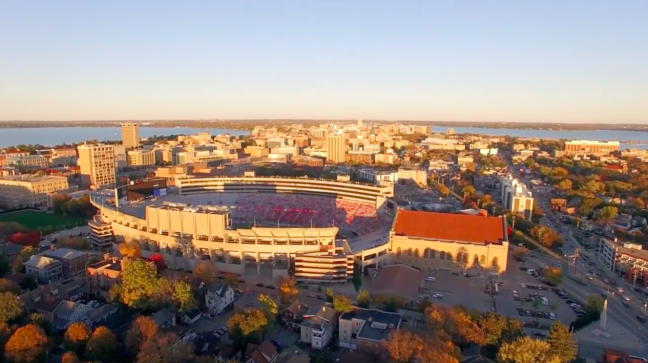According to the Wisconsin State Journal, the University of Wisconsin Police Department will require extra vetting for police officers working at UW football games come fall.
UWPD police chief Kristen Roman said officers from around the state who come to work at the games will have to prove they have clean records. If they have histories of using excessive force or violating civil rights, they will be unable to work at Camp Randall.
UWPD Director of Communications Marc Lovicott said the department lacks the staffing to handle large events like Badgers football games. He said the campus population can swell to double the usual size on game day weekends, so officers from other departments are called in to supplement the UWPD’s forces.
Police officers from outside of UWPD will have to meet local standards and undergo rigorous background checks.
“We actually swear them in, we deputize them if you will,” Lovicott said. “And they become employees of our department for those six or seven Saturdays during the football season.”
Lovicott said these new initiatives were not introduced because of any major problems with UWPD police misconduct, but because UW athletics requested a review of vetting procedures for football security personnel. Lovicott said the UWPD works to train the individuals who enter their jurisdiction from out of the area as well.
In response to the Black Lives Matter protests of the last year, “A Message from UWPD” was published online.
In the message, UWPD announced new standards and initiatives for active officers. These standards included the banning of chokeholds unless lethal force is necessary, the requirement to give a verbal warning before shooting a firearm and an increased focus on de-escalation techniques.
The message also acknowledged “the justified pain, anger, frustration, and resentment [the] community” and “the cumulative weight of [policing] history.”
Associate Students of Madison chair Matthew Mitnick said messages serve little purpose unless they are backed up with concrete changes.
“That’s just playing politics,” Mitnick said.
In September, ASM passed a vote of no confidence in UWPD. According to ASM’s website, the vote signified a lack of trust in UWPD due to their presence at the protests off campus, failure to comply with the “8 Can’t Wait” police reform policies and unwillingness to meet reforms requested by ASM leaders and students.
UWPD responded to this vote with an online statement.
“I’m disheartened. On behalf of the UWPD I say with the utmost confidence that we can be trusted. That doesn’t mean we’re perfect,” Roman said on the UWPD’s website.
Mitnick said in addition to falling short of #8cantwait standards, UWPD has a long history of violence against BIPOC students.
According to Mitnick, the vote signifies “a complete distrust” in UWPD’s ability to preform its responsibilities.
Mitnick also criticized UWPD for assisting the Madison Police Department at recent protests. He said he heard personal accounts of UWPD performing stop-and-frisk operations on students. He also expressed skepticism with regards to the need for additional officers at football games.
“I question why they need outside officers in the first place,” Mitnick said.
Lovicott said the high concentration of people in Madison on game days creates a stressful situation for police officers. He said the widespread consumption of alcohol exacerbates potential for illicit activity.
A study by the University of Kentucky revealed that, on average, over seven more crimes occur during home football games when compared to away football games. The study recommended decreasing tailgates.
Fan ejections at UW football games are higher than the national average. KGW 8 reported 344 fans were ejected from Badger football games in 2016.
Associate scientist for UW’s Center For Healthy Minds Dan Grupe said large crowds and stressful situations can activate a police officer’s flight-or-flight response.
“If an officer isn’t able to recognize and regulate this response, they can experience a narrowing of the field of vision, increased attention to threats in the environment and a shift from more intentional and goal-directed thinking to a more stimulus-driven or reactive response,” Grupe said.
Grupe said in this instinct-driven state, officers are more likely to resort to force if there is insufficient de-escalation training or a lack of experience involved. Grupe also said all officers act uniquely, so their responses to threats can be unpredictable.
UPDATED: City government members raise concerns about MPD lobbying in police policies
Grupe said mindfulness training can help reduce police officers’ stress and lead to more restraint. Grupe said UW is conducting research with UWPD and other police departments in Dane County to determine the impact of mindfulness meditation training to reduce the use of force by officers.
Despite criticism, Lovicott said UWPD is a progressive force on issues of mental health and police practices.
“We are a department of firsts,” Lovicott said. “We were one of the first police departments in the county with body cameras. We were one of the first, way back in the day, with dash cameras. We have the first female police chief in the state of Wisconsin.”


